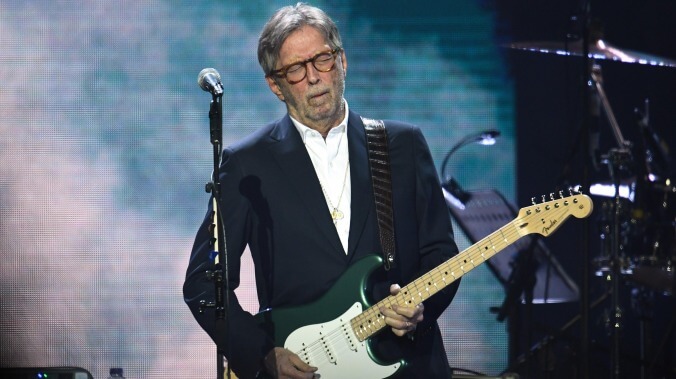Still not tired of all this, Eric Clapton continues promoting COVID misinformation
Sitting down with something called Oracle Films, Clapton says that no one wants to talk to him anymore

At age 76, Eric Clapton still wants to make the world worse. After producing an oeuvre of some of the most lukewarm blues rock imaginable, the three-time Rock & Roll Hall of Famer (who in 1976 told a live audience that he wants to “Keep Britain white”) is still spreading coronavirus conspiracy theories. Still not tired of this shit after a year and a half, Clapton sat down with something called Oracle Films. This loosely defined filmmaking team promotes free speech and open debate, meaning they’ve produced a couple of slick videos about how the lockdowns are bad, actually.
Clapton’s 25-minute interview is a map of his radicalization. Like many people who fell down the Qanon rabbit hole, old “Slowhand” details being disillusioned with the government during Brexit and turning to, you guessed it, YouTube. He discovered lockdown skeptics promoting “focused protection,” a widely criticized theory that would mean lockdowns for the most vulnerable and free and open spread for everyone else. As the pandemic continued, Clapton found himself frequenting COVID-skeptic channels on the encrypted chat app Telegram, where he found a community more welcoming to his distorted worldview and, in turn, alienated him from friends and family. It’s a tale as old as time (or, at least, the last five years or so).
“I would try to reach out to fellow musicians and sometimes I just don’t hear from them anymore,” Clapton said. “My phone doesn’t ring very often. I don’t get that many texts and emails any more. It’s quite noticeable.”
For his part, Clapton, once again, tells of his vaccination story, which he says left him bedridden for two weeks. Exacerbated by his pre-existing medical conditions, such as emphysema and nerve damage, the Astra-Zeneca (AZ) vaccine, he says, gave him many of the well-reported symptoms like chills, fever, and aches. Nevertheless, the experience he outlines was undoubtedly a little more intense than others:
 Keep scrolling for more great stories.
Keep scrolling for more great stories.
